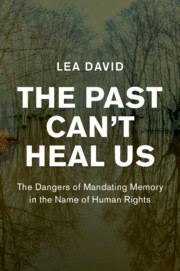Book contents
- The Past Can’t Heal Us
- Human Rights in History
- The Past Can’t Heal Us
- Copyright page
- Contents
- Acknowledgements
- Abbreviations
- 1 Introduction
- 2 Human Rights As an Ideology?
- 3 What Is Moral Remembrance?
- 4 The Institutionalisation of Moral Remembrance
- 5 The Institutionalisation of Moral Remembrance
- 6 Human Rights, Memory and Micro-Solidarity
- 7 Mandating Memory, Mandating Conflicts
- Bibliography
- Index
6 - Human Rights, Memory and Micro-Solidarity
Published online by Cambridge University Press: 26 June 2020
- The Past Can’t Heal Us
- Human Rights in History
- The Past Can’t Heal Us
- Copyright page
- Contents
- Acknowledgements
- Abbreviations
- 1 Introduction
- 2 Human Rights As an Ideology?
- 3 What Is Moral Remembrance?
- 4 The Institutionalisation of Moral Remembrance
- 5 The Institutionalisation of Moral Remembrance
- 6 Human Rights, Memory and Micro-Solidarity
- 7 Mandating Memory, Mandating Conflicts
- Bibliography
- Index
Summary
This chapter elaborates on how moral remembrance resonates for local communities. It briefly theorises the concept of solidarity as currently understood, placing particular focus on Randall Collins’s work on the significance of interaction ritual chains and emotional energy. Central to his interaction ritual chain theory is the notion that people in face-to-face encounters produce mutual rituals that are sustained through an emotional energy that results in a feeling of membership and in a desire for action that is considered a morally ‘proper’ path. Drawing on numerous human rights–sponsored memorialisation initiatives in the Western Balkans and Israel–Palestine, the chapter analyses the myriad of ‘facing the past’ dialogue groups. The chapter demonstrates that ‘facing the past’ encounters ritualise historical narratives and generate a strong vocabulary of sentiments, which, in the long run, does not translate transnational solidarity into human rights values but ends up strengthening ethnic homogenisation, essentialisation and group polarization. In other words, moral remembrance does not offer a real alternative to sustaining those emotions and transforming them into solid, long-lasting human rights values; instead, contrary to what would be expected, it strengthens the narrow, ethnically based nationalist perceptions of collective memory, and reproduces nationalist discourses and practices.
Keywords
- Type
- Chapter
- Information
- The Past Can't Heal UsThe Dangers of Mandating Memory in the Name of Human Rights, pp. 124 - 185Publisher: Cambridge University PressPrint publication year: 2020

